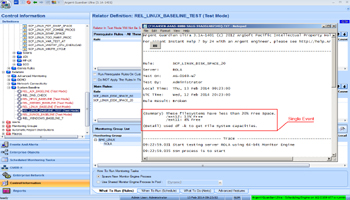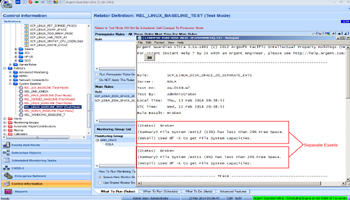How To Set UNIX Rules To Fire Events For Individual Objects
The Argent UNIX Rules are typically configured to fire a single event for the condition as a whole – the entire Rule’s script is treated as a Boolean Pass or Fail
For example, take the bundled SCP_LINUX_DISK_SPACE_20
This Rule is broken if any file system tested by the Rule’s script has less than 20% free space
But only a single event is fired for all the file systems that have less than 20% free space
As a result, the condition won’t corrected unless all the file systems have more than 20% free space
The bundled Rule SCP_LINUX_DISK_SPACE_20 in Argent AT fires separate events by default
The internal mechanism to identify an event as the same ‘Argent AT event‘ is to compare following fields:
- Node name
- Relator name
- Rule name
- Comparison string
The enhanced Rule script should looks like:
#!/bin/sh
#
# SCP_LINUX_DISK_SPACE_20.TXT
#
# This script returns XML data to The Argent Guardian service running on W2000
#
# The output will be the ASCII string of ‘PASS‘ or ‘FAIL‘
#
#
#
#
# Copyright (c) 2005 ArgSoft Intellectual Property Holdings, Limited
#
# All Rights Reserved
#
# ArgSoft Intellectual Property Holdings, Limited
#
#
# This is PROPRIETARY SOURCE CODE of ArgSoft Intellectual Property Holdings, Limited
#
# The contents of this file may not be disclosed to third parties, copied or
# duplicated in any form, in whole or in part, without the prior written
# permission of ArgSoft Intellectual Property Holdings, Limited
#
# RESTRICTED RIGHTS LEGEND:
# Use, duplication or disclosure by the Government is subject to restrictions
# as set forth in subdivision (c)(1)(ii) of the Rights in Technical Data
# and Computer Software clause at DFARS 252.227-7013, and/or in similar or
# successor clauses in the FAR, DOD or NASA FAR Supplement
#
# Unpublished – rights reserved under the Copyright Laws of the United States
# and other countries
#
#
#
#
# This Rule uses df to check for filesystems free space
#
# The Rule fails if there is less than 20% free space
#
# For more information: email Unix@Argent.com
STATUS=NOVAL
SUMMARY=NOVAL
COMMENT=NOVAL
#
# xmlOut() – prints an entire XML output for a command script
#
# Used for The Argent Guardian Rules that return a PASS/FAIL
#
# status and summary and comment descriptions
#
xmlOut()
{
xmlBegin
xmlStatus
xmlEnd
}
#
# xmlBegin() – Prints out the definition of the XML format used to
#
# send status data to The Argent Guardian
#
xmlBegin()
{
cat <<!
<?xml version=”1.0″?>
<!DOCTYPE TAGResult
[
<!ELEMENT TAGResult (QEResult+)>
<!ELEMENT QEResult (status, summary, comment)>
<!ELEMENT status (#PCDATA)> <!– (PASS | FAIL) –>
<!ELEMENT summary (#PCDATA) >
<!ELEMENT comment (#PCDATA) >
]>
<TAGResult>
!
} # End of xmlBegin()
#
# xmlStatus() – Send a status block to The Argent Guardian. The
#
# status should be ‘PASS’ or ‘FAIL’. The summary explains the result
#
# and the comment is a generic description of the Unix Rule
#
xmlStatus()
{
cat <<!
<QEResult>
<status>$STATUS</status>
<summary>$SUMMARY</summary>
<comment>$COMMENT</comment>
</QEResult>
!
} # End of xmlStatus()
#
# xmlEnd() – Completes the XML data block
#
xmlEnd()
{
cat <<!
</TAGResult>
!
} # End of xmlEnd()
############################# Main portion of script ##########################
#
# Set the IFS variable, which is used by the read command to parse input
#
# We wish to read the input one line at a time
#
IFS=”
#
# Use the df command to get information about the filesystems
#
DFCMD=”df -k”
#
# The FREE_PCT variable defines the minimum percentage of free disk space
#
# for each filesystem
#
FREE_PCT=60
#
# Define any directories you wish to ignore here. Directory variables
#
# should start at ‘1’ and increment continuously. The following are
#
# three example variables (that would need to be uncommented)
#
#IGNORE1=”/usr”
#IGNORE2=”/”
#IGNORE3=”/tmp”
#
# Assume the status of the Rule is OK
#
STATUS=PASS
EXIT_CODE=0
SUMMARY=”All filesystems have at least ${FREE_PCT}% of their space free”
COMMENT=”Used ${DFCMD} to get File System capacities”
xmlBegin
#
# Iterate through all the filesystems
#
for fs in ‘eval $DFCMD’; do
#
# FS is the actual filesystem, MNT is the mounted directory. Include
#
# an ‘x’ before the line in case the filesystem is blank
#
FS=`echo $fs | awk ‘ { print $1 } ‘`
MNT=`echo x$fs | awk ‘ { print $6 } ‘`
#
# Skip the first line of DFCMD, which is the column headers
#
if [ “$FS” = “Filesystem” ]; then
continue
fi
#
# Derive the free space from the capacity used and compare it to
#
# the threshold
#
CAPACITY=`echo $fs | awk ‘ { print $5 } ‘`
CAPACITY=`echo $CAPACITY | sed ‘s/%//’`
FREE_SPACE=`expr 100 – $CAPACITY`
if [ “$FREE_SPACE” -lt “$FREE_PCT” ]; then
#
# Make sure we don’t wish to ignore the directory
#
ignoredir=””
igcount=1
#
# Create the ‘testvar’ variable, and iterate until it is blank
#
eval testvar=”\$IGNORE${igcount}”
until [ “x$testvar” = “x” ]; do
if [ “x$testvar” = “x$MNT” ]; then
ignoredir=1
fi
igcount=`expr $igcount + 1`
eval testvar=”\$IGNORE${igcount}”
done
if [ “x$ignoredir” != “x” ]; then
#
# Ignore this directory
#
continue;
fi
STATUS=FAIL
EXIT_CODE=1
SUMMARY=”File System $MNT (${FREE_SPACE}%) has less than ${FREE_PCT}% Free Space.”
xmlStatus
fi
done
if [ $STATUS = “PASS” ]; then
xmlStatus
fi
xmlEnd
exit $EXIT_CODE
When individual file system, say ‘/ext11‘, does not break the Rule any more, the event for file system ‘/ext11‘ will be corrected while leaving the event for file system ‘/ext12‘ pending

